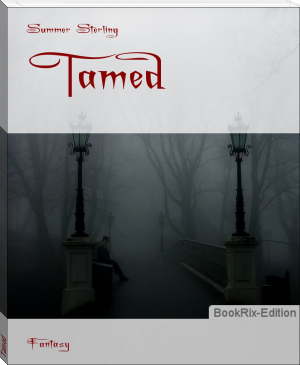The Atlantic Book of Modern Plays, Gordon Bottomley et al. [kiss me liar novel english .TXT] 📗

- Author: Gordon Bottomley et al.
Book online «The Atlantic Book of Modern Plays, Gordon Bottomley et al. [kiss me liar novel english .TXT] 📗». Author Gordon Bottomley et al.
It is obvious throughout that she and her husband have been happy comrades in their life together, and that a deep fundamental bond has united them in spite of the different social spheres from which each has sprung.
WHITE (seeing she has paused). Go on, dear; go on. Let's hear all of it.
HILDA. Oh, what's the use, Will? You know how differently he feels about the war.
WHITE (with quiet sarcasm). But it's been so many years since your respectable brother has honored me even with the slightest allusion—
HILDA. If you care for what he says—(continuing to read the letter)—"Remember, Hilda, you are an American. I don't suppose your husband considers that an honor; but I do."
WHITE (interrupting). And what kind of an American has he been in times of peace? He's wrung forty per cent profit out of his factory and fought every effort of the workers to organize. Ah, these smug hypocrites!
HILDA (reading). "His violent opposition to America going in has been disgrace enough—"
WHITE. But his war profits were all right. Oh, yes.
HILDA. Let me finish, dear, since you want it. (Reading) "—been disgrace enough. But now that we're in, I'm writing in the faint hope, if you are not too much under his influence, that you will persuade him to keep his mouth shut. This country will tolerate no difference of opinion now. You radicals had better get on board the band wagon. It's prison or acceptance." (She stops reading.) He's right, dear. There will be nothing more intolerant than a so-called democracy at war.
WHITE. By God! It's superb! Silence for twenty years and now he writes his poor misguided sister for fear she will be further disgraced by her radical husband.
HILDA. We mustn't descend to his bitterness.
WHITE. No: I suppose I should resuscitate the forgotten doctrine of forgiving my enemies.
HILDA. He's not your enemy; he merely looks at it all differently.
WHITE. I was thinking of his calm contempt for me these twenty years—ever since you married me—"out of your class," as he called it.
HILDA. Oh, hush, Will. I've been so happy with you I can bear him no ill will. Besides, doesn't his attitude seem natural? You mustn't forget that no man in this country has fought his class more than you. That hurts—especially coming from an acquired relative.
WHITE. Yes; that aggravates the offense. And I'll tell you something you may not know. (Bitterly) Whenever I've spoken against privilege and wealth it's been his pudgy, comfortable face I've shaken my fist at. He's been so damned comfortable all his life.
HILDA. (She looks at him in surprise.) Why, Will, you surely don't envy him his comfort, do you? I can't make you out. What's come over you these last weeks? You've always been above such personal bitterness; even when you were most condemned and ridiculed. If it were anybody but you I'd think you had done something you were ashamed of.
WHITE. What do you mean?
HILDA. Haven't you sometimes noticed that is what bitterness to another means: a failure within oneself? (He goes over to chair and sits without answering.) I can think of you beaten by outside things—that sort of failure we all meet; but somehow I can never think of you failing yourself. You've been so brave and self-reliant: you've fought so hard for the truth.
WHITE (tapping letter). But he thinks he knows the truth, too.
HILDA. He's also an intense nature.
WHITE (thoughtfully after a pause). Yet there is some truth in what he says.
HILDA (smiling). But you didn't like it—coming from him?
WHITE. It will be different with you and me now that America's gone in.
HILDA. Yes. It will be harder for us here; for hate is always farthest from the trenches. But you and I are not the sort who would compromise to escape the persecution which is the resource of the non-combatant.
(The phone rings: he looks at his watch.)
WHITE. That's for me.
HILDA. Let me. (She goes.) It may be Wallace. (At phone) Yes: this is 116 Chelsea. Long Distance? (He starts as she says to him) It must be our boy. (At phone) Who? Oh—Mr. William White? Yes: he'll be here. (She hangs up receiver.) She'll ring when she gets the connection through.
WHITE (turning away). It takes so long these days.
HILDA. Funny he didn't ask for me.
WHITE. What made you think it was Wallace?
HILDA. I took it for granted. He must be having a hard time at college with all the boys full of war fever.
WHITE. And a father with my record.
HILDA. He should be proud of the example. He has more than other boys to cling to these days when everybody is losing his head as the band plays and the flag is waved. He won't be carried away by it. He'll remember all we taught him. Ah, Will, when I think we now have conscription—as they have in Germany—I thank God every night our boy is too young for the draft.
WHITE. But when his time comes what will he do?
HILDA (calmly). He will do it with courage.
WHITE (referring to her brother's letter). Either prison or acceptance!
HILDA. I would rather have my son in prison than have him do what he felt was wrong. Wouldn't you?
WHITE (evasively). We won't have to face that problem for two years.
HILDA. And when it comes—if he falters—I'll give him these notes of that wonderful speech you made at the International Conference in 1910. (Picking it up) I was looking through it only this morning.
WHITE (troubled). Oh, that speech.
HILDA (glancing through it with enthusiasm). "All wars are imperialistic in origin. Do away with overseas investments, trade routes, private control of ammunition factories, secret diplomacy—"
WHITE. Don't you see that's all dead wood?
HILDA (not heeding him). This part gave me new strength when I thought of Wallace. (Reading with eloquence) "War will stop when young men put Internationalism above Nationality, the law of God above the dictates of statesmen, the law of love above the law of hate, the law of self-sacrifice above the law of profit. There must be no boundaries in man's thought. Let the young men of the world once throw down their arms, let them once refuse to point their guns at human hearts, and all the boundaries of the world will melt away and peace will find a resting-place in the hearts of men!"
WHITE (taking it from her). And I made you believe it! What silly prophets we radicals were. (He tears it up.) Mere scraps of paper, dear; scraps of paper, now.
HILDA. But it was the truth; it still is the truth.
WHITE. Hilda, there's something I want to talk over very, very seriously with you. I've been putting it off.
HILDA. Yes, dear? (The outer door is heard to bang.) Listen: wasn't that the front door?
WHITE. Perhaps it's the maid?
HILDA (a bit nervously). No: she's upstairs. No one rang. Please see.
WHITE (smiling). Now don't worry! It can't possibly be the Secret
Service.
HILDA. One never knows in war times what to expect. I sometimes feel I am in a foreign country.
(WHITE goes slowly to the door in back and opens it. WALLACE, their son, with valise in hand, is standing there, as if he had hesitated to enter.
He is a fine clean-cut young fellow, with his father's physical endowment and his mother's spiritual intensity. The essential note he strikes is that of honesty. It is apparent he is under the pressure of a momentous decision which has brought him unexpectedly home from college.)
WHITE. Wallace!
WALLACE (shaking hands). Hello, Dad!
HILDA. Wallace! My boy!
(WALLACE drops valise and goes to his mother's arms.)
WALLACE (with deep feeling). Mother!
WHITE (after a pause). Well, boy; this is unexpected. We were just talking of you.
WALLACE. Were you?
HILDA. I'm so glad to see you, so glad.
WALLACE. Yes—yes—but—
WHITE. There's nothing the matter?
HILDA. You've had trouble at college?
WALLACE. Not exactly. But I couldn't stand it there. I've left—for good.
WHITE. I was sure that would happen.
HILDA. Tell us. You know we'll understand.
WALLACE. Dad, if you don't mind, I'd like to talk it over with mother first.
WHITE. Of course, old fellow, that's right. She'll stand by you just as she's always stood by me—all these years. (He kisses her.) I—I—
(He smooths her hair gently, looking into her eyes as she smiles up at him.)
We mustn't let this war hurt all we've had together—you and I—
HILDA (smiling and turning towards her son). And Wallace.
WHITE. And Wallace. Yes. (WALLACE looks away guiltily.) Let me know when the phone comes.
(He goes out hastily. She closes the door after him and then comes to WALLACE, who has sat down, indicating he is troubled.)
HILDA. They made it hard for you at college?
WALLACE. I don't know how to tell you.
HILDA. I understand. The flag waving, the patriotic speeches, the billboards advertising the glory of war, the call of adventure offered to youth, the pressure of your friends—all made it hard for you to be called a slacker.
WALLACE, No, mother. I wasn't afraid of what they could call me.
That was easy.
HILDA (proudly). You are your father's son!
WALLACE. Mother, I can't stand the thought of killing, you know that. And I couldn't forget all you've told me. That's why I've had to think this out all these months alone; why I've hesitated longer than most fellows. The only thing I was really afraid of was being wrong. But now I know I'm right and I'm going clean through to the limit.
HILDA. As your father said, I 'll stand by you—whatever it is—if only you feel it's right.
WALLACE. Will you? Will you, mother? No matter what happens? (She nods.) I knew you would. (Taking her hand) Then, mother, listen. I've volunteered.
HILDA (shocked). Volunteered!
WALLACE. Yes. I leave for training-camp to-night.
HILDA. To-night?
WALLACE. Yes, mother. Once I made up my mind, I couldn't wait to be drafted. I wanted to offer myself. I didn't want to be made to go.
HILDA (hardly grasping it). But you are too young.
WALLACE. I lied about my age. You and father can stop me if you tell the truth. That's why I've come back. I want you to promise you won't tell.
HILDA. You ask me to aid you in what I don't believe? WALLACE. But you said you'd stick by me if I thought it was right.
HILDA. But—
WALLACE (with fervor). And I tell you, mother, I do feel it was right for America to go in. I see now we ought to have declared war when they crushed Belgium. Yes; we ought to have gone in when the Lusitania was sunk. But we've been patient. The President tried to keep us out of it until we had to go in to save our self-respect. We had to go in to show we were men of honor, not pussy-cats. We had to go in to show the world the Stars and Stripes wasn't a dish-rag on which the Germans could dry their bloody hands!
HILDA (gazing at him incredulously). You hate them as much as that?
WALLACE. Hate? No, mother, no. (As if questioning himself) I really haven't any hate for the German people. People are just people everywhere, I suppose, and they're tricked and fooled by their rotten government, as the President says.
HILDA. Then why fight them?
WALLACE. Because they're standing back of their government, doing what it says. And they've got to be licked to show them what kind of a government they have.
HILDA. At least you have no hate in your heart—that's something.
WALLACE. Oh, yes, I have, mother. But it isn't for the poor devils I've got to shoot. It's for the stay-at-home fellow here in America who sits in a comfortable armchair, who applauds patriotic sentiment, cheers the flag, and does nothing for his country but hate and hate—while we fight for him. That's the fellow I'll hate all right when I sit in the trenches. And that's why I couldn't look myself in the face if I stayed out a day longer; why I've got to go in; why I'm going to die if I must, because everybody ought to be willing to die for what he believes.
HILDA. You are my son, too! For I would willingly have died if it could have kept us out of this war.
WALLACE. Yes. I am your son, too. And that's why you wouldn't respect me if I didn't go through.
HILDA. No. I wouldn't have respected you.





Comments (0)